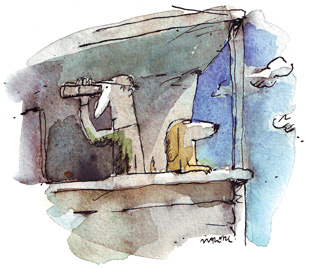
Illustration by Caroline Magerl.
[Note: this column by Peter Bass has replaced Peter Spectre's regular column, which was titled "In the Lee of the Boathouse." Mr. Spectre remains as editor of
Maine Boats, Homes & Harbors magazine.]
I have had the great fortune to spend a lot of time during the last 50 years sitting in a particular corner of a particular porch in Boothbay Harbor, at different times accompanied by grandparents, parents, siblings, children, grandchildren, and many friends. I have always thought that if I were to write a book about my family it would have to be called A Porch Runs Through It. When Peter Spectre decided to give up this spot in the magazine and I was asked to do a column in its place, the metaphor for the title was obvious. With the above cast of characters and many more besides, I have watched, discussed, dissected, and opined about all the news of our lives and our state, whether fit to print or not, often aided by adult beverages when appropriate. This column will, as did Mr. Spectre’s did, report on what I find interesting along and about the Maine coast, in no particular order.
The metaphor was easy, but the title wasn’t. Peter Spectre suggested “Feet up, Binoculars at the Ready.” My younger daughter liked all the options that included “Off My Rocker.” My older daughter chose the title we picked; my son, an editor of Skiing magazine, was too wrapped up in articles of his own to straighten out the old man. So here we are.
I am full of ideas, opinions, and plenty of the other stuff. So let’s go, at no great speed and in no particular direction. I’m going to start with lobsters, which have to pop up somewhere in every issue.
Homarus americanus
In 2007, the Maine Department of Marine Resources conducted a lobster trap study around Monhegan Island to get some hard data on the relationships among the number of traps fished, the frequency of hauling, and the total catch. In the most general terms, the data indicated that more traps did not necessarily mean enough additional lobsters to justify the added time and cost. High fuel costs push the equation even more toward fishing fewer traps in smaller boats closer to home.
For those of us who use Maine’s waters for pursuits other than lobster fishing, the prospect of fewer traps in the water is always appealing, although for me anyway, even if there were only one buoy in the water, it would lie directly in my path. The sheer number of buoys has led even the most diligent and sympathetic of yachtsmen to add line cutters to their prop shafts. As we go to print, I would guess changes to trap limits, retirement of ghost licenses, and limited availability of new ones will be driving a lot of chatter along the coast.
Want to become the lobster expert on your porch? Read
The Lobster Coast by Colin Woodward,
The Lobster Gangs of Maine by James Acheson, and
The Secret Life of Lobsters by Trevor Corson. Want to really learn how to put on a lobster feed? Get a 16", three-tier aluminum steamer from
www.wokshop.com and a 54,000-Btu propane burner from
www.kingcooker.com. I have two complete sets, and I’m thinking about a third for corn.
SAD stands for…
When Maine did the big school consolidation in the 1960s and created the School Administrative Districts out of smaller rural town school departments, in the opinion of my Uncle George it was truly a SAD day. Maybe some money was saved, maybe the consolidated high schools could offer a broader range of science classes with nicer equipment and labs, but towns lost a key part of their identities. Uncle George pointed out to me that very often what gave kids the confidence to do something more with life was the opportunity to be a big fish in a small puddle in high school. And more small high schools gave more kids opportunities to be big fish.

Illustration by Caroline Magerl.
Think of it this way: a lot more kids get to be on the basketball team when there are five teams instead of one, ditto for other teams, clubs, plays, etc. We gave up a lot. Bigger schools remained independent, and downeast there was a kind of hybrid organization called a school union, which tried to strike a middle ground between local control and economies of scale. Well, Nancy, here we go again. The current crop of geniuses running the state are forcing a further consolidation, and who knows what we’ll give up this time. Maybe we should look to the lobster study and have smaller schools closer to home. Who knows, we might harvest more keepers.
Back in April, Allison Knab in the online version of
The York Weekly reported on a Belly Dancing class being offered locally. Given in several locations in York County, the weekly class gets women together for some serious aerobic work and a lot of laughs. Looks like fun, but I just want the outfits.
The alewife movement
The river herring or alewife has been in the news a lot lately. Once a major source of lobster bait and a key forage fish for those farther up the food chain, dams and pollution have reduced the legendary runs of these anadromous fish. More recently, the humble alewife has seen barriers removed and waters cleaned up. (See “Feast of the Season,”
MBH&H #99, May 2008, #99.)
One place where the alewife movement is having some trouble is, oddly enough, in one of Maine’s prized waterways, Grand Lake Steam, where alewife fishway improvements have lodge operators, guides, and sportsmen worried about competition with landlocked salmon and smallmouth bass. As of this writing, scientists were having little luck convincing the aforementioned group that the eating habits of alewives have little in common with those of their money species. A compromise is in the works that will have played out somewhat by the time this is published. My opinion? I have always found it hard to argue against free-flowing rivers; it seems like censorship to me.
Homes & Harbors
In the mid 1980s, I built a home in Yarmouth to a peculiar design known as an envelope house. It was a house within a house with a convection-driven envelope of air circulating through the crawl space, north wall, roof, and solarium. The inner house was always surrounded by a temperate envelope, making it warm in winter and cool in summer. It took us awhile to learn its tricks, but it worked great, the house needing little
supplemental heat.
With my typical fine timing, I owned and then sold the house during a period of cheap energy in a town that prized instant colonials and vast square footage. It had the look of a giant shed, beautiful in a
Whole Earth Catalog kind of way. In the mid-nineties when we sold it, few called it handsome. However, at four dollars a gallon for heating oil (my last price in the spring), it has achieved a spectacular beauty.
Old hippies and envelope houses aside, the Maine coast is sprouting green buildings everywhere. The
Bangor Daily New s reported on a tour of three sites on Mount Desert Island by University of Maine architecture students. The buildings included dorms, labs, and residential housing. In Freeport, a four-bedroom, 3,500-square-foot home is the first in the northeast to receive a Leadership in Energy and Environmental Design (LEED) platinum rating for green building. In the spring of 2007, the Freeport Community Center organized a designer show-house type promotion and got a lot of local folks through the building, which was built on speculation and is for sale for about a million dollars. There were few
Whole Earth Catalog toters in the potential buyers’ group.
Continuing our green technology track, down at
The Quoddy Tides, the newspaper out of Eastport, there was an interesting article on, of all things, Quoddy tides and a new (to me anyway) hydroelectric generation technology called horizontal-axis hydrokinetic generation. In simple terms, it is a turbine in a big tube suspended horizontally in moving water. No dams or impoundments, all you need is enough moving water, which is available in spades in Lubec Narrows. A Houston Company, Hydro Green Energy, has applied for a preliminary permit from the Federal Energy Regulatory Commission (FERC) to study the feasibility of the project.
These generators can be positioned outside shipping lanes. There are some illustrations on the company’s web site,
www.hgenergy.com, which indicate that an array of these generators would look like a large raft on the surface. The facility is scalable by adding units. It looks like a great idea, although I’m sure that some group somewhere will find a reason to link arms and sing “Kumbaya” for its demise. God help us if it interferes with lobster fishing. I’m sure the Irving brothers would be pleased to pull it over to the other (Canadian) side of the narrows.
Pens & Piles
Nearby in Calais, a couple of guys are making writing pens from whatever intrigues them and can be worked with tools: wood, antlers, bowling balls, acrylics, you name it. The idea is to incorporate something of personal significance into a tool you can use every day. The
Bangor Daily News did a nice article in April. You can find out more at
www.mainelypens.com. I once cut up a rowboat that my grandfather had given me when I was eight. I recycled a few parts of it into a duplicate I built some years ago, a boat which I have given to my daughter. It’s now in her yard, awaiting a new purpose. Perhaps I should have taken the stem to Mainely Pens and given each of my children a piece of the old girl. Time to start looking in your pile.

Illustration by Caroline Magerl.
Speaking of piles, there was a collection of Maine short stories published some years ago called
The Quotable Moose: A Contemporary Maine Reader which included a story by Richard Peck called simply “Piles.” A pile is what a man collects over time; it is his self-defining hedge against shortage, inflation, divorce, poverty, or any combination thereof. It’s a spiritual thing that women are incapable of understanding. Peck’s essay gets as close as you can to defining the importance of the pile. Read it and know. The rest of the book is good, too.
I was recently asked to participate in a workshop to discuss spirituality and the workplace. I am not religious about anything except boats. My wife has a hard time understanding why I was invited and she wasn’t. She pointed out that her nightstand is piled with books that deal with the meaning of life and my nightstand is piled with boating magazines. So what’s the point here?
Public art, for better or worse
Not to be outdone by the famous illustrated gas tank next to the highway in Dorchester, Massachusetts (the one that some wags suggest carries the image of Ho Chi Minh), the Maine Center for Creativity is soliciting submissions for designs to be painted on the Sprague Energy tanks in South Portland. If fund-raising succeeds and the project moves forward, we could be experiencing our own public “trompe d’oil” tanks in 2011. See
www.mainecenterforcreativity.org. Hopefully it won’t include a profile of Uncle Ho.
In the public art realm, many cities have enjoyed or have been subjected to, depending on one’s point of view, versions of Chicago’s famous decorated cows, which themselves were a copy of a 1999 cow project in Zurich, Switzerland. Portland did lighthouses to mixed reviews. I read that Zurich has filed an intellectual property lawsuit to prevent those who had cows in Chicago from having more cows in London. Norfolk, Virginia, did mermaids, many of which rival Chicago’s cows for creativity. Maybe Portland should have chosen an animate model. There’s always the clam.
Within the last year or so, one of the boating magazines, I apologize for not remembering which one, ran a fascinating article about the refit and reuse of the lightship Nantucket as a floating bed and breakfast in Nantucket Harbor. It was a marvelous use of the old ship, but it does make it hard to take a walk before breakfast.
On a similar note, a press release we received highlighted several river cruise ships in Eastern Europe that had been converted to hostel accommodations. They feature modestly priced rooms in great downtown locations in their respective cities. Think the Queen Mary in Long Beach, but on a more affordable scale. The release got one of our editors thinking about the possibilities right here in Maine using old sardine carriers. Think of the scented lotions in those little bottles in the bathrooms, or maybe a giant pipe could suck you right off the dock and spit you into your cabin. My guess is that from a regulatory standpoint, it is probably easier to get approval for floating hotels in Budapest than in Belfast.
In closing...
One thing I always liked about Peter Spectre’s column was that he often found some interesting use or mis-use of the language. I am trying to tune my ear and eye to picking these up in my daily reading but currently have only this to offer. I call it “The Nouns That Shouldn’t Become Verbs Department,” in this case the rather newish verb “to impact.” In Falmouth, a scholarship fund was set up to honor the memory of a school bus driver who was a great favorite with her charges. She, in the words of our local publication,
The Shopping Notes, “lovingly impacted many generations of children.” I never realized that a school bus could be such a sensitive tool.
I invite your own submissions from the publications of the coast.
Finally, thanks, Peter, for the chance to do the column and to John Hanson and Gretchen Piston Ogden for taking the chance.
We have set up a feedback section below, so weigh in if you feel like it, and I’ll answer if I feel like it. In the meantime sit back down, there’s still a little light left and plenty to talk about. Feet up, binoculars at the ready!
Long-time
MBH&H Contributing Editor, freelance writer, and raconteur Peter Bass is an owner of Maine Cottage Furniture.
Click here to read other articles by Peter Bass >> Illustration by Caroline Magerl.
Illustration by Caroline Magerl. Illustration by Caroline Magerl.
Illustration by Caroline Magerl. Illustration by Caroline Magerl.
Illustration by Caroline Magerl.






